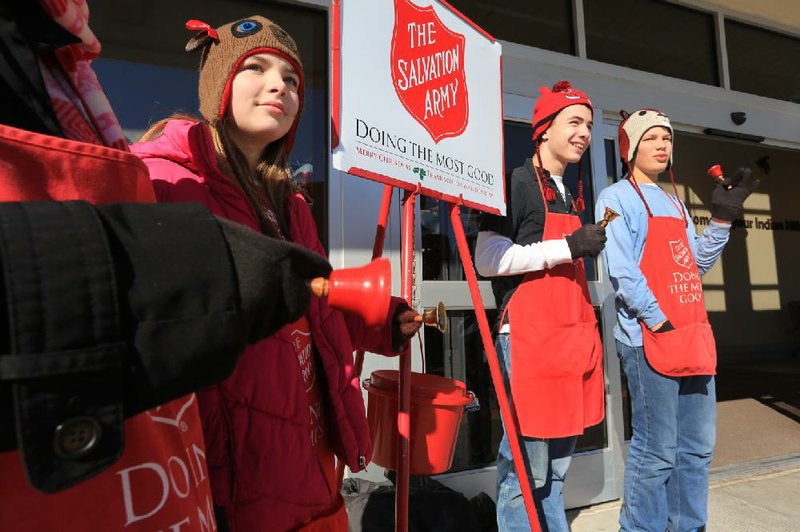PINE BLUFF - The recent ice storm and a rare calendar occurrence that shortened the Christmas-shopping season by six days has cost one of the most recognizable charities thousands of dollars in donations.
Officials with the Salvation Army’s Central Arkansas Area Command - which covers four counties and the state’s capital - said their annual red-kettle campaign will be about $40,000 short of the $400,000 goal this year.
The campaign is the largest fundraiser for the Salvation Army.
“We knew it was going to be a tough year to start with since Thanksgiving came so late and shortened our season,” said Capt. Roger Glick, area commander for the Salvation Army’s central Arkansas office.
“Because the snow and ice prevented us from getting out on a number of days, we are poised to raise less than we had hoped. Because we run so lean, this shortfall will hit us particularly hard.”
Bell ringers are allowed to set up the red kettles only between the Saturday after Thanksgiving and Christmas Eve, according to Salvation Army officials.
The Salvation Army served 12,000 people in central Arkansas last year with such things as feeding the homeless and through the annual angel tree, which gives gifts to families and children in need during the Christmas season.
Kathy Barbeire, marketing and public relations coordinator for the Central Arkansas Area Command, said the $40,000 shortfall will keep the agency from expanding its shelter and - in a worst case scenario - could lead to staffing cutbacks.
There are 14 full-time staff members at the Salvation Army’s Little Rock office, and more are needed, Barbeire said.
“We would like to hire additional staff members and volunteer coordinators to offer more services in the shelter,” Barbeire said.
“We often have people call us who want to teach life-skills classes, but we need additional staff to supervise and coordinate to make sure the classes are effective and making a difference. And, right now, we just can’t do that.”
The situation is the same in other places.
At the Salvation Army in Jonesboro, Maj. Eugene Gesner said his chapter is $17,000 behind its 2013 goal of raising $110,000. He also cited recent winter weather and the shortened Christmas season as chief reasons for the shortfall.
“Normally we can make or come close to our goal,” he said. “Not this year. It’s also been tough because we had to run our shelters 24 hours a day during the ice storm. That takes a lot of money.”
On Tuesday outside a Pine Bluff retail store, Salvation Army bell ringer Tina Menendez said she can understand why funds might be down this year.
Menendez said she has seen “a lot less giving this year,” and “you can tell people are being a lot tighter with their loose change.”
Salvation Army donations have taken a hit in other parts of the U.S. this Christmas season.
Officials at the Salvation Army’s Muncie, Ind., chapter said they are behind more than $80,000 in their goal of reaching $165,000 during the holidays.
Lt. Mary Robbins with the Muncie chapter said the shorter holiday period between Thanksgiving and Christmas played a role, according to an article from The Associated Press. But she also said that fewer people have cash on hand these days because consumers increasingly make purchases with debit or credit cards, the article said.
“We know people are communicating differently than they used to, so how they donate and spend money changes, too,” she said. “I really don’t believe we have a drop in supporters. We have to find ways to get them online and thinking of us when they give.”
Arkansas, Pages 11 on 12/25/2013
